Senior Stories
by Kate Frentzel
Each year, Luther sends a graduating class into the world with the power of a Luther experience behind them. Here, we profile six new Luther alumni who are prepared to learn and lead and live with impact.
Excelling in the lab and on the stage
Luther students often combine diverse interests, but few have pursued two equally demanding paths with as much passion and dedication as Shana Liu. As a neuroscience major and music minor, she excelled in the classroom, thrived in a Mayo Clinic internship, and played with immense artistry on not one but two instruments during her time at Luther.
Liu grew up in Urbandale, Iowa, watching two older sisters play piano and violin. “Of course I wanted to be just like them—I started playing those instruments, and thank goodness I actually did like them for myself,” she laughs.
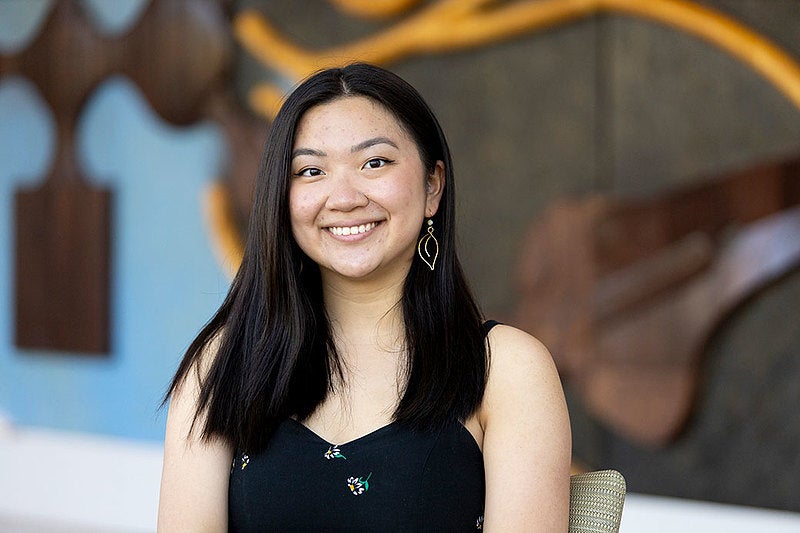
Shana Liu
But despite her musical talent, Liu entered Luther focused on STEM studies. “I actually didn’t even take viola lessons at first because I wanted to save time,” she says. “But I saw everyone doing it, and I thought, You know what? I’m at Luther, it’s focused on liberal arts, and they’re giving me the choice to participate in as many things as I want.”
Through her music studies, playing in ensembles, and performing accompaniment for other musicians, Liu found peace and respite. “As a Luther student,” she says, “you can feel like parts of yourself are scattered across campus because you’re involved in so many things. Music is where I can just forget all of that—even if I do love all of it.”
While Liu was regularly spending 14–21 hours per week practicing her instruments, she was also thriving in her neuroscience major. Junior year, she spent spring semester in Luther’s Rochester program, interning with a neuromodulation research lab at Mayo Clinic. “Rochester was instrumental in helping me see how the process of learning is usually better than any result, like a test grade,” she says. “The people I was working with—my lab head and the PhD students—were so thirsty to learn, and they instilled that in me. It helped me become more independent, and in the research world you have to have some independent, creative thinking.”
Liu credits her Mayo Clinic experience with helping her gain acceptance into the University of Iowa Carver College of Medicine, where she starts studying this fall after completing an ophthalmology research fellowship this summer—and where she also plans to audition for the university’s symphony orchestra.
But back in May, Liu was overjoyed—as winner of Luther’s piano concerto competition—to cap off her time at Luther by performing a piano solo with Symphony Orchestra the weekend of Commencement. “This has been a highlight because I get to combine some of my solo work with literally my favorite thing on campus: Symphony Orchestra. It’s my home away from home,” she says. “So now I get to play with my friends. I get to collaborate with my conductor, Dr. Baldwin, whom I respect and admire a lot. I got tickets for my parents, who were carting me around to lessons when I was in high school and middle school. Every day I leave rehearsal, I think, Wow, I’m so lucky to do this.”
Finding strengths
Levi Bird is a seeker. He has an innate curiosity about the world around him and how to find meaning for himself and others in it. As he navigated his time at Luther, this spirit of exploration and discovery acted as a compass.
As an incoming first-year student from Muscoda, Wis., Bird participated in the Endeavor Together program, a pre-orientation experience that brought together small groups of new students for community-building trips. He returned to the program to co-lead a group of ten students as a sophomore, and he became program assistant his junior year. Endeavor Together was a pivotal experience; it helped him realize that he wanted a future in which he facilitated reflection and fostered deep conversation.
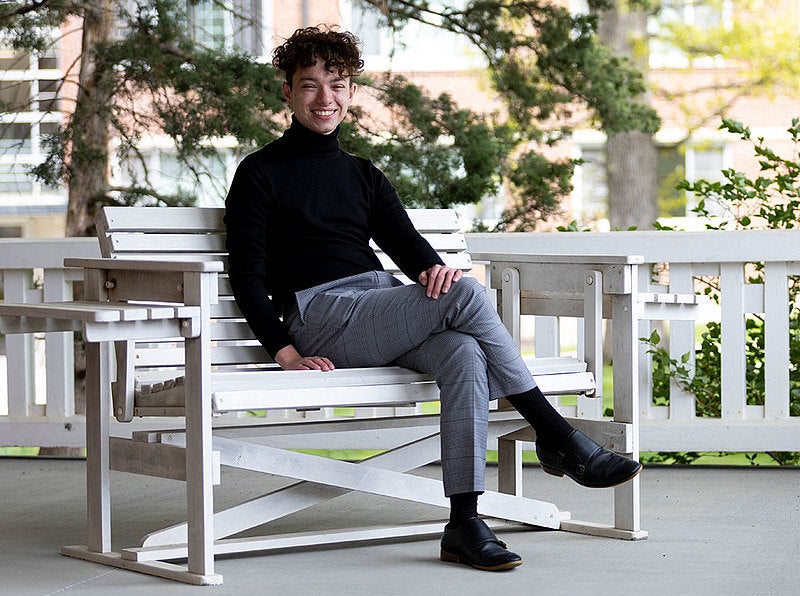
Levi Bird
As an incoming first-year student from Muscoda, Wis., Bird participated in the Endeavor Together program, a pre-orientation experience that brought together small groups of new students for community-building trips. He returned to the program to co-lead a group of ten students as a sophomore, and he became program assistant his junior year. Endeavor Together was a pivotal experience; it helped him realize that he wanted a future in which he facilitated reflection and fostered deep conversation.
In spring 2020, Bird participated in Luther’s Rochester Semester, where he interned at the Diversity Council. He worked on its Human Library Initiative, which collects and shares community members’ stories around experiencing bias and prejudice, and helped improve its website design. The experience itself taught him a lot, but equally powerful was the work he did during the semester around intentional reflection through Luther’s Career Center, especially through the Clifton Strengths program and the Design Your Life curriculum. Soon, not only was he a participant, he was co-facilitating—with professor Jodi Enos-Berlage and Career Center assistant director Miriam (Blom) Skrade ’04—a Design Your Life conversation group for his fellow Rochester Semester students. By fall, he was officially working at the Career Center as both a Strengths ambassador and a career and life design intern, leading workshops and working one-on-one to help students discover their strengths and make meaning of their life and work experiences.
Bird has a natural talent for building bridges and facilitating discussion. It’s part of why he was one of two students selected as a 2019–20 Peace Scholar to participate in a six-week program through which he studied some of the central issues and theories regarding conflict, war, and peace.
The experience was really meaningful for Bird, a Nordic studies major who chose the field in part because the Nordic countries are often lauded for their social welfare systems. As a Nordic studies major, he was interested in exploring how close to perfect they really are. He also loved that the major, while focused on language and literature, allowed him to explore all aspects of human expression and society, as well as psychology, philosophy, and anthropology.
As a first-generation college student, Bird seized every opportunity to explore his vocation and at Luther and found himself growing emotionally and personally, especially as he came to recognize his identity as a gay man. When he arrived at college, he says, “I was very traditional in the ways I was religious. Being at Luther, it was very much this opening up in terms of thinking about what my identity meant as a Christian.” He sought counsel from friends and college pastors, and, he says, “The combination of people at Luther, from students to faculty to staff, were so supportive.”
The vocational, intellectual, personal, and spiritual work he’s done over his four years at Luther means that he can finally feel like “I’m bringing my full self and all my strengths to what I’m doing,” Bird says.
Starting this fall, he’ll be sharing those strengths as a coach with Luther’s Catalyze program, which helps Pell-eligible and/or first-generation college students navigate the college experience.
Empowering others
As a social work major who wants to help Black women, refugees, and immigrants, Peilla Ishimwe took an active role in shaping her education. Whenever she had to write a paper, she used the opportunity to learn about these populations and their struggles. Her research has focused on the mental health resources available to US refugees and immigrants, and also those available to Black and indigenous students of color at predominantly white institutions. Knowing that eventually she’ll return home to Burundi, she says, “I tried to use my education not only to benefit people in the US but also to make it something I can carry into the world to be useful.”
Ishimwe, who attended high school at Waterford Kamhlaba United World College of Southern Africa, was equally focused in her internships. When she heard about the Intercultural Mutual Assistance Association in Rochester, Minn., she pursued a placement there wholeheartedly since it aligned so well with her values. At IMAA, an organization providing support services to refugees and immigrants, Ishimwe conducted client intakes, sometimes for victims of domestic abuse or sex trafficking, and connected them with available resources.
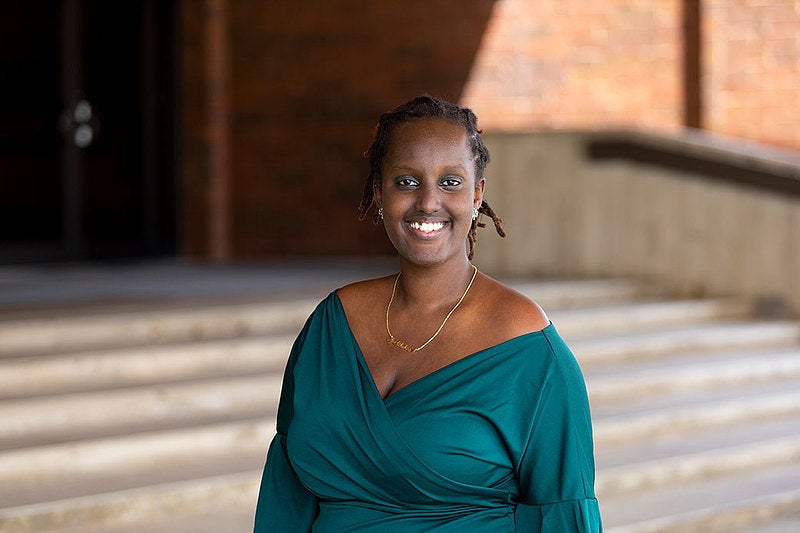
Peilla Ishimwe
During college, Ishimwe supported women and families in a few different contexts, including at Helping Services for Youth and Families and at the Iowa Department of Public Services, both in Decorah. She also interned with Burundi Friends International, an aid organization through which she acted as a community facilitator with the Women Empowered Program, which helps women form community savings groups that allow them to become entrepreneurs and gain some financial agency.
Through her diverse experiences, Ishimwe developed a lot of cultural sensitivity and learned that empowerment looks different to different communities. “In the US,” she says, “you hear about Planned Parenthood access and reproductive health and the wage gap. But in Burundi, women are not allowed to own land. They want to save money to own a bike, or raise pigs, or send their kids to school. For them, that’s empowerment.”
Even while the obstacles in her home country seem greater, Ishimwe has hope: “Burundian girls are capable of doing amazing things; they just need people to believe in them. I’m going to be that person. In a sense, every internship or opportunity or volunteer activity that I do is to help make sure that the generation after me will feel more empowered than I do.”
Ultimately, Ishimwe hopes to increase support for victims of gender-based violence in Burundi by expanding access to women’s shelters throughout the country and also by advocating for policies that protect survivors and allocate adequate resources to social services. She’ll get one step closer to her goal this fall, when she starts a master’s program in social work at McGill University in Montreal, Canada, fully paid for through a Mastercard scholarship.
“I’m a kid from Burundi who didn’t have the means to go to college in Burundi, but here I am,” she says. “I feel like I have a huge responsibility toward my people, toward Burundian women, to make sure that tomorrow is better than today.”
Connecting with the wider world
Aaron Blumberg is a traveler. He was born in Johannesburg, South Africa, and grew up in a Jewish enclave of friends and family in Melbourne, Australia. He made the decision to attend Luther after representing Australia on the men’s senior basketball team in Israel during the Maccabiah Games, which he describes as the Jewish Olympics. Once he knew what was out there, he says, “It didn’t make sense to limit myself to one country, one city, one culture, one religion. The world’s way too big to confine myself that way. It’s a good purpose to explore.”
Blumberg had been thinking about playing college basketball—which meant he’d have to study abroad, since Australia doesn’t participate in college sports—but his experience at the Maccabiah Games sealed the deal.
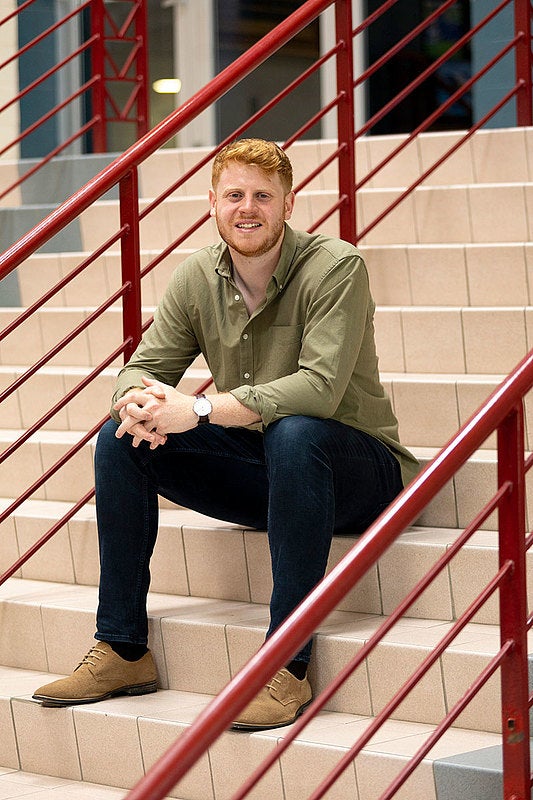
Aaron Blumberg
Playing college basketball was, he says, “by far the most rewarding thing I’ve ever done. It’s also by far the most difficult, with the most highs and lows.” He went from practicing two or three times a week back home to practicing six times a week and lifting weights three or four times a week. “The level of playing was at a higher quality than I was used to,” he says. “It really did push me and challenge me.”
It also introduced him to some of his closest friends. “I’m proud of the development I made as a basketball player and my personal achievements, but what matters most are the connections I made with people. Throughout my four years I met probably 40, 50, 60 teammates, and I think I’ll remain close with those people forever.”
Basketball also taught Blumberg to manage his time carefully in order to excel in his data science and mathematics/statistics majors. In addition to learning in the classroom, he completed internships at both Ernst and Young, on one of their transaction advisory teams, and at a sustainability-focused startup called Adaptive Green, where he helped the New York–based company strategize an expansion to the West Coast.
Blumberg has long been fascinated with financial markets. He sees them as another way to connect with the wider world. “The coolest thing about markets is that they give you a snapshot of what’s happening in the world. You might see some sort of currency drop or a huge climb in a sort of equity, but it’s all derived from world events,” he says. “Markets are a quantitative snapshot of what’s happening in the world, and the more I understand them, the more I enjoy them. I get worldly information and learn as much as I can through these numerical representations.”
This fall, Blumberg starts a master of financial mathematics program at the University of Chicago, where he received a generous scholarship. While he’s thrilled to have received an opportunity in the prestigious program, his Luther nostalgia looms large. “I really built a great network and an extensive group of friends,” he says. “I really felt a part of Luther, which was an amazing feeling.”
Making change through service
Maren Gabor’s journey through college has focused a lot on learning how she can best help people. “I viewed volunteering and being involved as important as getting an A in a class,” she says.
As a biology major from Algona, Iowa, who chose the health field as a way to help people, she adds, “Getting an A doesn’t mean learning the material—they’re separate things. I would apply myself in my courses and do the best I could. I would read my textbooks and study hard, but in my free time on the weekends and at night when I needed a break from studying, I would spend that time in my organizations or volunteering. I wasn’t going to take a trip to Rochester when I could volunteer at the Vesterheim.”
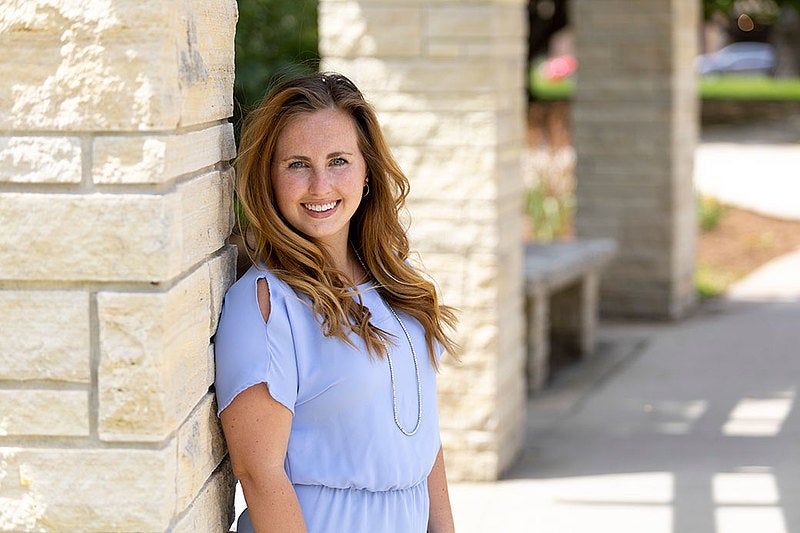
Maren Gabor
As a student, Gabor averaged about 25 hours of service per week—on top of a full course load. Among other things, her involvement, which was broad and included a lot of leadership roles, encompassed Student Senate (campus betterment chair); service fraternity Alpha Phi Omega (pledge-trainer); child-mentoring program PALS (treasurer); and intergenerational-friendship program GrandPALS. Within her sorority, Tau Delta Gamma, she organized lots of volunteering opportunities with Winneshiek Gift of Life’s breast cancer awareness events.
In part through volunteering, she says, “Decorah became my community. And it was exciting to see the programs I was involved in helping the Decorah community, which was my community. It was really special to me. Luther is in Decorah, and we help each other. I really found that through my volunteering.”
Gabor also focused her efforts on campus. Through her position in Student Senate, she worked to address the equity gap by helping draft letters to the administration about course and housing policies related to international students and students of color. She also helped articulate student expectations regarding COVID-19 and the school returning to in-person operations. In addition, Gabor served as student liaison on Luther’s Curriculum Committee, where she advised a group of professors and administrators on curriculum changes and development. Serving in these roles, Gabor says, was how she felt she could have the most impact on the student body and the administration toward the kind of change she wanted to see on campus.
But in working to improve Luther and Decorah, Gabor also saw a change in herself. “It’s something I started to strive for because I felt good about volunteering and it made me feel good about myself. It’s like getting an A on an exam, that really proud moment you have—you did your best. I also felt that after I’d volunteer and see a job done or after I cleaned up a stretch of highway or mentored a child. I felt that after doing these things in my community.”
Reflecting on the end of her time at Luther, Gabor says, “I did as much as I could to see change in myself and change around me.”
Protecting the planet through engineering
Nicholas Behrens, a physics major and chemistry and mathematics minor from Falcon Heights, Minn., has logged a lot of time in the lab. He’s also logged a lot of time in nature. He’s hiked, biked, kayaked, or camped in nearly 30 national parks and extensively in the Decorah area.
Behrens’s experiences in nature have helped him understand the world, he says, as “a delicate balance of co-existence” that needs and deserves protecting. His love of the natural world is part of what drew him to Luther, and it’s part of what’s driving his future career path.
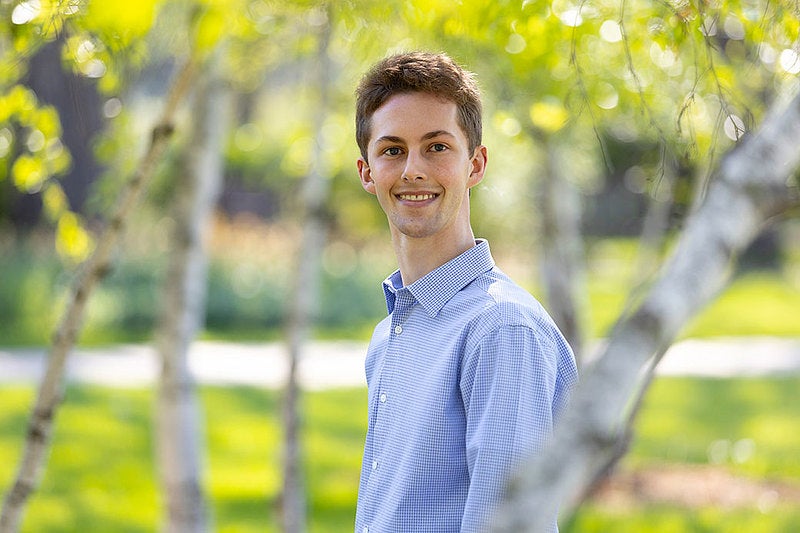
Nicholas Behrens
Behrens plans to use science—specifically physics and engineering—in order, he says, “to be a steward of our natural and built environments, and to shape technological innovations that improve the human condition within an equitable and global context.”
And he’s building the science chops to make this happen. During his time at Luther, he conducted research with several professors in Luther’s math, chemistry, and physics departments. The past two years, he conducted research with physics professor Todd Pedlar, funded through the National Science Foundation, focused on studying elementary particle decays for the Belle II/KEK accelerator project in Japan. It’s an incredible opportunity for an undergraduate student to participate in a groundbreaking international collaboration aimed at better understanding the smallest possible building blocks of the universe.
Particle physics isn’t where Behrens sees himself long-term, though. This fall, he begins a PhD program in electrical engineering with a focus on applied physics at Cornell University in Ithaca, N.Y. Training at this tier-one research school will help him explore avenues toward conservation-focused engineering, like high-energy density plasma physics, which could eventually provide essentially unlimited amounts of energy without radioactive byproducts, or micro- and nanotechnology and small-scale robotics, which could help monitor environmental quality.
While Behrens’s future learning will become increasingly specialized, he’s grateful and glad that he studied physics within a liberal arts context as an undergraduate. Through his humanities classes, he gained a better appreciation for how humans impact the lives of each other and our shared planet, which was instrumental in his choice to pursue conservation-minded engineering. The liberal arts model also allowed him to play in three music ensembles, which has brought joy and balance to his life.
And when it comes to the lab, he says, Luther’s approach to education helped him learn “to search for answers when no official solutions or even methods for arriving at solutions exist. As students, we weren’t set on a path to arrive at a predetermined answer, and that will be relevant for any kind of research I’m going to do in the future.”